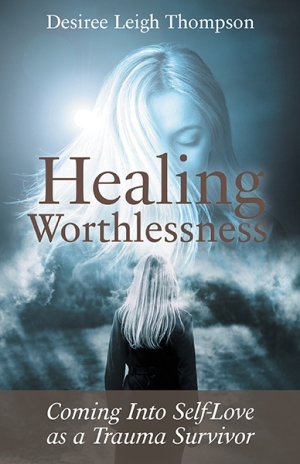Healing Worthlessness
Coming into Self-Love as a Trauma Survivor
Based in personal experiences, the self-help text Healing Worthlessness addresses the society-wide problem of abuse with love and compassion.
Drawing on the work of psychoanalysts and upon personal experiences, Desiree Leigh Thompson’s Healing Worthlessness implores society to address the trauma that results from abuse.
Thompson grew up in a blue-collar household where abuse was ignored or condoned; she survived incest, sexual assault, emotional abuse, and partner violence. She became well acquainted with self-destructive behaviors, and the implications of her early traumas followed her into adulthood. When she was thirty-six, she realized that her mental state had impacted her three children, and she decided to report the crimes that had been committed against her.
Through Thompson’s story, the book shows that hard work goes into achieving health after trauma. Thompson credits her education, yoga and meditation, and psychotherapy in reaching health; she became a life coach to help other survivors. Her book is a gentle guide through recovery, with advice for accessing vulnerability, forming new identities, and maintaining emotional wellness.
The book also calls on society to address its misogyny, which it argues has led to a pandemic of abuse against women and children. It summarizes research on sexual trauma and its chronic health effects as well; its suggestions for supporting pregnant survivors (a group that is elsewhere underaddressed) are a necessary addition.
Though its perspectives are clear, the book’s tone is friendly and purposeful. Its information is prefaced by continual acknowledgements of survivors’ courage and significance. It includes poignant quotes and direct and explicit language. Ultimately, its focus on statistics is less welcoming than its global considerations, delicate handling of trigger warnings, and deliberate addresses to women. The book’s suggestions that complementary psychotherapy be pursued are thoughtful, built on citations of the unknown factors of healing, and on the practicality of a multifaceted approach to healing.
Thompson’s authentic and engaging account of surviving abuse stands to help others wake up to the importance of self-care and empathy; it encourages fellow survivors to “rise up with me for our dignity and rights, and for the dignity and rights of every other woman.” However, some of the text is repetitive. Some sentences revisit ideas within a closed space, as of emptiness and hollowness; elsewhere, a quote from Carl Jung repeats, as does a story about a messy dish being thrown. More effective is the text’s continual emphasis on the necessity of social reform, with primary preventions suggested in most chapters.
Based in personal experiences and supported by an extensive bibliography, the self-help text Healing Worthlessness addresses the society-wide problem of abuse with love and compassion.
Reviewed by
Samantha Ann Ehle
Disclosure: This article is not an endorsement, but a review. The publisher of this book provided free copies of the book and paid a small fee to have their book reviewed by a professional reviewer. Foreword Reviews and Clarion Reviews make no guarantee that the publisher will receive a positive review. Foreword Magazine, Inc. is disclosing this in accordance with the Federal Trade Commission’s 16 CFR, Part 255.


